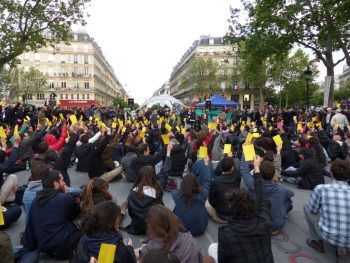David Byrne at his own website:
 Our system—as evidenced by studies at Princeton University and Northwestern University and other research—is not a true representative government. The will of the majority of people in the US is not represented—except in those cases when the desires of the majority match the policies favored by the wealthy and powerful. Their interests are more often enacted into law. We, therefore, do NOT live in a democracy.
Our system—as evidenced by studies at Princeton University and Northwestern University and other research—is not a true representative government. The will of the majority of people in the US is not represented—except in those cases when the desires of the majority match the policies favored by the wealthy and powerful. Their interests are more often enacted into law. We, therefore, do NOT live in a democracy.
As Tim Wu points out in the New York Times, the wishes of the majority are often all but ignored:
About 75 percent of Americans favor higher taxes for the ultrawealthy. The idea of a federal law that would guarantee paid maternity leave attracts 67 percent support. Eighty-three percent favor strong net neutrality rules for broadband, and more than 60 percent want stronger privacy laws. Seventy-one percent think we should be able to buy drugs imported from Canada, and 92 percent want Medicare to negotiate for lower drug prices. The list goes on.
I saw Astra Taylor’s documentary What Is Democracy? recently, and it got me thinking—which is what this film is meant to do. It’s not a movie that hands out answers, and it never mentions “Individual 1”. I’m not an expert on any of this, but especially considering the times we live in, I have taken an amateur’s passionate interest in wondering what this thing we claim to love so much really is.
Cornel West was at the screening (he also appears in the film), and he made the point that democracy alone is not going to solve our problems or lead to some of the big changes that are needed in the US or other countries. Brown v. Board of Education, the Civil Rights Act and Women’s Suffrage did not happen because they were put to a vote. In fact, West pointed out, if some of these things had been put to a vote, they probably would have been rejected. The voice of the people—which is heard via voting—needs to be coupled and linked with other institutions for the whole thing to work. The rule of law, a drive for justice, a free press…I would also venture to say that if there’s too much economic inequality, you can’t have democracy as well. In such situations, democracy is not possible.
More here.
